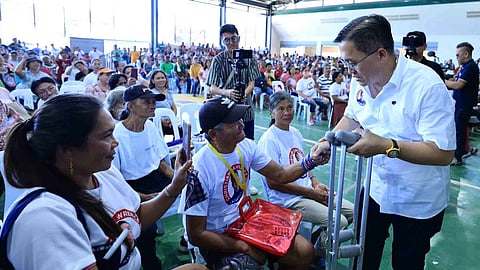
- NEWS
- the EDIT
- COMMENTARY
- BUSINESS
- LIFE
- SHOW
- ACTION
- GLOBAL GOALS
- SNAPS
- DYARYO TIRADA
- MORE

Emphasizing the necessity of addressing these key health issues through preventive care coverage and improved benefits package, Senator Christopher “Bong” Go inculcated his appeal to the Philippine Health Insurance Corporation (PhilHealth) to expand healthcare benefits, particularly for the country’s top ten leading causes of death.
“Our mission for much improved public healthcare and expanded health services does not end with the scrapping of the [single period of confinement] policy,” Go said.
The lawmaker has also called out PhilHealth’s capacity to do more, stating that the agency has ample resources but has yet to fully maximize its services to benefit Filipinos.
“PhilHealth has reserve funds, which is why they were flagged by the National Treasury because of their overwhelming reserves. Why not consider adding more benefit packages, and increase case rates, so there is lesser out-of-pocket expenditure?” Go questioned.
In response, PhilHealth executive vice president Atty. Eli Santos confirmed that the agency is working on delivering its promises.
He also stated that the agency is committed to increasing case rates by 50 percent across the board before the end of November 2024.
Furthermore, PhilHealth is set to release an expanded dental benefits package by December 2024, as well as guidelines for emergency care coverage.
Despite these assurances, Go remained firm in holding the agency accountable, stating that promises made must translate into real benefits for the Filipino people.
One of the critical points raised during the hearing was the need to focus on the leading causes of death in the Philippines.
Dr. Tony Leachon, a health advocate, stressed that any increase in case rates should target the most common and deadliest diseases.
He argued that these conditions account for 80 percent of deaths in the country and should be prioritized to have a more significant impact on public health.
Go echoed these concerns, questioning why more concrete actions had not been taken to address the top diseases. He pointed out that despite PhilHealth’s ample resources, many high-cost conditions continue to place a heavy burden on patients.
In his remarks, Go supported the call for more transparency, asking PhilHealth to provide concrete numbers on how much of their reserve funds would be used for benefit expansion and what measures were in place to prevent the mismanagement of these funds in the future.
Visiting vulnerable sectors
Meanwhile, Go, who chairs the Senate Committee on Health and Demography, visited the
Caraga Region and Davao Oriental and inspected the Super Health Center there, underlining the critical need for healthcare access and assistance for vulnerable sectors across the country.
They distributed food packs, snacks, vitamins, masks, shirts, foldable fans and sports equipment like basketballs and volleyballs. Some beneficiaries also received additional items such as shoes, mobile phones, bicycles and watches.
Following the activity, Go inspected the ongoing construction of the new Super Health Center at Barangay Poblacion in Caraga.
He further emphasized the importance of building healthcare facilities such as Super Health Centers, a crucial part of his continued commitment to enhancing healthcare accessibility nationwide.
Apart from this, Senator Go personally extended assistance to 1,124 indigent sectors in Caraga, Davao Oriental, composed of farmers, fisherfolks and senior citizens.
Senator Go, long known for his dedication to helping ensure that no Filipino is left behind, has always been a strong advocate for various vulnerable sectors of society.
“The farmers and fisherfolks are the backbone of our nation’s food supply, and our senior citizens are the guardians of our values and history,” Go highlighted.
He also stressed that these sectors are crucial to the town’s progress, which is why he has supported numerous legislative measures aimed at improving their welfare and ensuring they have access to essential services.
Last February, Republic Act 1982, or the Amendments to the Centenarian Act, was signed into law by President Ferdinand “Bongbong” Marcos Jr., which Go co-authored and co-sponsored in the Senate.
The law now includes cash gifts for Filipinos aged 80, 85, 90 and 95, amounting to P10,000 each, in addition to the existing P100,000 cash gift for centenarians.
